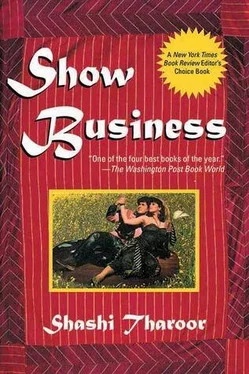The fact that she abandoned her brief filmi comeback after the disastrous Dil Ek Qila has only helped. Rural voters don’t think too highly of young actresses, though they like to watch them: in their lexicon the term actress equals something between “brazen hussy” and “fallen woman.” They see Maya, though, as a wife and mother; she doesn’t look or behave like an actress and the few who know she was one also know she gave it up to be the wife and mother she now so plainly is. So she is welcomed into their homes, where she asks knowledgeably about babies’ colic and the availability of sugar. Between her and me, we’ve sewn up the female vote in the constituency, and, as everywhere in India, men are merely a minority. When Maya goes back to Bombay to rejoin the kids, promising to return in a week’s time for the concluding stages of the campaign, I am feeling extremely confident.
Ashwin is not.
Much against my better judgment I have agreed, at his request, to attend a strategy session with the main campaign workers one night. It has been a particularly exhausting day, and I am not fully attentive as he introduces a number of disquieting trends and a larger number of unquiet party men in terms that fail to register clearly in my bleary consciousness. To my uninitiated mind, earnest Rams merge with voluble Shyams, caste calculations fuse confusingly with the arithmetic of the campaign accounts. As the conversation wears on, though, my confidence fades. The details may still be fuzzy in my mind, but the overall picture is depressingly clear.
The consensus of the professionals seems to be that the Pandit has too many groups committed to him: the Brahmins because he is a Brahmin, the minorities because he is known as a champion of the minorities, the poor because he can always blame the party in power for their poverty. The latest blow is that, after a national deal between their parties, the official Communist party candidate has just withdrawn in his favor. The traditional mistrust of the outsider is also being assiduously cultivated by Sugriva Sharma’s campaigners. Although we are both first-time contenders in this constituency, the Pandit is a former Chief Minister in this same state, and he can trace his roots — as he never fails to remind his audiences in the broad local dialect — to the hills a hundred kilometers away. Whereas I don’t look or sound like a local, and I haven’t a fraction of his political experience to offer. The Pandit, I learn, has taken to referring to me patronizingly as “the boy,” a term that is gaining circulation; his sidekicks more disparagingly call me naachnewala, the fellow who dances. The Rams and Shyams shift uneasily in their steel folding chairs, shaking their heads grimly and drowning their despair in endless cups of oversugared tea.
I cannot believe this. “What about my crowds?” I ask. “What about the way people follow me about? What about Maya?”
“We can’t afford to read too much into all that,” Ashwin says. “It might just be the Madurai effect.”
“The what?”
“The Madurai effect. Sorry, political shorthand.” Is it my imagination, or does Ashwin seem to revel in reminding me of my ignorance at every opportunity? “In the 1967 elections, the biggest crowd in the history of Indian elections turned up at Madurai to listen to Mrs. Gandhi, the new Prime Minister, campaign for the local Congress candidate. They stayed four hours in the heat and applauded her to a man. When the voting actually took place, the Congress candidate lost his deposit.”
“In other words,” I interpret the lesson, “they came out of curiosity, not out of support?”
“Exactly,” Ashwin nods. “In our country, elections are a popular tamasha every five years, a spectacle, an entertainment for the bored masses. People will gather to watch an unusual candidate in much the same spirit as they might stand around to watch a monkey-man performing tricks.” I look at him sharply, but the simile seems to have been chosen at random. I don’t know how faithfully Ashwin has watched my films. In fact, I realize with a twinge of guilt, I don’t know very much about Ashwin at all. I spent very little time with him after going to college and entering my own world. I have no real image of my brother since the days we played cricket outside the house as schoolboys. I recall with a fond smile that I used to bully him into long spells of bowling.
“So what do you think we should do?”
“Keep at it,” Ashwin replies shortly. “That’s all we can do. There are no public opinion polls, no way we can really be certain if Sugriva Sharma has the votes he thinks he does. It’s always possible that the endorsements of the leaders of each of these communities and factions may not, in this case, translate into votes at the booths. That’s one hope: your appeal as a film star may reach deeper into people’s personal voting intentions than their leaders’ instructions. And then there’s the idea of Ganeshji’s here. I think we should pursue that.”
“What idea was that?” As usual, I seem to have missed something. I look at Ganeshji, the idea man Ashwin indicates, a dark and pudgy campaign worker with more oil in his hair than you need to run a Jeep. He has been chain-smoking beedis throughout the conference; any suggestions he may have made were occluded by struggling to emerge from behind a smelly miasma of fumes, which were occasionally cleared by a gust of air from his rasping cough. Really, it’s not always my fault I don’t catch what’s going on.
Ashwin is patient with me. “As Ganeshji points out,” he says, with a perfunctory nod to the innovative smoker, who beams in creative pride, “the Pandit is taking his own community for granted — the Brahmins and the rather sizable ‘Hindu vote’ that, in this constituency, comes with them. That may yet prove a tactical mistake, because there are quite a few Brahmins who probably consider Sugriva Sharma something of a traitor to their caste. We must step up our appeals to that community and to the Hindu-inclined element generally. There’s one particular suggestion Ganeshji has that we can act on tomorrow.”
The thought of tomorrow is already exhausting me. “What’s that?”
“There’s a local sage here, a sort of guru who runs an ashram on the banks of the river. He has only been in the district for eight or nine years, but he’s already something of a legend. People are beginning to come from all over the country and even from abroad to listen to him. The villagers hold him in awe, the Brahmins particularly, since he is said to know more about the scriptures than the priests at the temple. You should pay him a visit.”
I groan. “Now I’ve got to get the blessings of a godman?”
“We don’t know whether he’ll bless you,” Ashwin says, “but even if he just sees you, it could have a positive effect. Every little bit counts, Ashok.”
Of course I agree; not that I have a choice. Plans are duly made for a pilgrimage to the ashram in the morning. Apparently the Guru’s fame has spread so far and wide that he is attracting a growing number of foreigners, some of whom are acquiring prominence in his entourage. This has inevitably fueled the usual resentments, and the Guru has had to keep his local and expatriate followers apart as much as possible. For both linguistic and factional reasons, therefore, he has taken to holding two public sessions a day, one in English and one in Hindi.
“I suppose you’d like me to go to the Hindi one,” I say brightly. “To be seen to be there by the local yokels.”
“Wrong,” says Ashwin. “I think you ought to go to the English one. If things go wrong there, the damage can more easily be contained than if you suffer some sort of public indignity in front of your own electorate.”
Читать дальше












